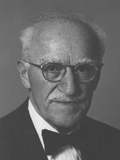Joseph M. Juran
| Joseph M. Juran |
|---|
| See also |
Joseph M. Juran was born on December 24 1904 in the village located in what is now Romania (d. 28 February 2008). In 1912 he came with his father to the United States. At 16 he enrolled in college, which continued then in university. He supported himself by doing odd jobs. After graduation, he began working in the industry, where he met for the first time with Walter A. Shewhart. He accepted the offer to participate in the work of Shewhart, which gave him the opportunity to acquire experience on issues of statistical quality control. During World War II he worked in the Lend-Lease. After the war he started working as an independent consultant and lecturer. In 1954 he was invited to deliver a series of lectures for Japanese engineers. They proved to be very successful. Juran remained in Japan, where he popularized the ideas of quality. One of his ideas was to conduct radio programs devoted to quality. Also contributed to the establishment of the Day of Quality. In 1979 he founded Juran Institute[1], which aims to popularize and develop his methods[2].
Publications
Juran wrote several books on quality. The most important are:
- Juran's Quality Handbook, published for the first time in 1951 and then updated 5 times.
- What is Total Quality Control? The Japanese Way published in 1954.
- Quality Planning and Analysis, co-authored with Frank Gryna, 1970.
Achievements
- Idea of quality circles, implemented later by Kaoru Ishikawa
- Juran's trilogy - Planning, Control, Improvement
- Quality costs - Juran created one of most popular quality costs models
- 10 steps of quality improvement
References
Author: Slawomir Wawak
